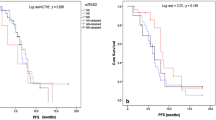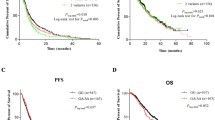Abstract
Excision repair cross-complementation group 1 (ERCC1) and xeroderma pigmentosum-F (XPF) in the nucleotide excision repair pathway have been effectively repairing DNA damage induced by chemotherapeutic agents. We conducted a cohort study to assess the associations of ERCC1 and XPF polymorphisms with response to platinum-based chemotherapy and clinical outcome of non-small-cell lung cancer (NSCLC). One hundred eighty-seven NSCLC cases treated with platinum-based chemotherapy were prospectively analyzed. The predictive value of four SNPs in ERCC1 and two SNPs in XPF in patient's response and survival related to platinum-based chemotherapy were analyzed using χ 2 tests, Kaplan-Meier method, log-rank test, and Cox proportional hazards regression. The overall chemotherapy response rate for treatment was 51.18 %. One hundred eighty-seven patients were followed up, and the median survival time is 17.6 months (ranged from 1 to 50 months). A total of 106 patients (56.68 %) died from NSCLC during the follow-up period. Carriers of the rs3212986 AA and A allele had a borderline significantly lower response rate to the chemotherapy. In the Cox proportional hazards model, patients carrying the ERCC1 rs3212986 AA genotype were significantly associated with increased risk of death from NSCLC when compared with those with CC genotype as a reference variable. This study reported that variants in ERCC1 can be used as a prognostic maker to platinum-based chemotherapy in NSCLC patients.

Similar content being viewed by others
References
International Agency for Research on Cancer (2008). Lung cancer incidence, mortality and prevalence worldwide in 2008. http://globocan.iarc.fr/factsheet.asp. Accessed 8 Jul 2013
Molina JR, Yang P, Cassivi SD, et al. Non-small cell lung cancer: epidemiology, risk factors, treatment, and survivorship. Mayo Clin Proc. 2008;83:584–94.
Siegel R, Naishadham D, Jemal A. Cancer statistics. CA Cancer J Clin. 2012;62:10–29.
Goffin J, Lacchetti C, Ellis PM, Ung YC, Evans WK. First-line systemic chemother-apy in the treatment of advanced non-small cell lung cancer: a systematic review. J Thorac Oncol. 2010;5:260–74.
Takenaka T, Yano T, Kiyohara C, Miura N, Kouso H, Ohba T, et al. Effects of excision repair cross-complementation group 1 (ERCC1) single nucleotide polymorphisms on the prognosis of non-small cell lung cancer patients. Lung Cancer. 2010;67(1):101–7.
Friedberg EC. How nucleotide excision repair protects against cancer. Nat Rev Cancer. 2001;1(1):22–33.
Hoeijmakers JH. Genome maintenance mechanisms for preventing cancer. Nature. 2001;411(6835):366–74.
Reed E. Platinum-DNA adduct, nucleotide excision repair and platinum based anti-cancer chemotherapy. Cancer Treat Rev. 1998;24(5):331–44.
Laura JN, Nikhil B, Richard DW. ERCC1 and non-small-cell lung cancer. N Engl J Med. 2007;356:2538–41.
Sijbers AM, de Laat WL, Ariza RR, Biggerstaff M, Wei YF, et al. Xeroderma pigmentosum group F caused by a defect in a structure-specific DNA repair endonuclease. Cell. 1996;86:811–22.
Chu H, Gu D, Xu M, Xu Z, Gong Y, Gong W, et al. A genetic variant in ERCC2 is associated with gastric cancer prognosis in a Chinese population. Mutagenesis. 2013;28(4):441–6.
Rumiato E, Cavallin F, Boldrin E, Cagol M, Alfieri R, Basso D. ERCC1 C8092A (rs3212986) polymorphism as a predictive marker in esophageal cancer patients treated with cisplatin/5-FU-based neoadjuvant therapy. Pharmacogenet Genomics. 2013.
Biason P, Hattinger CM, Innocenti F, Talamini R, Alberghini M, Scotlandi K, et al. Nucleotide excision repair gene variants and association with survival in osteosarcoma patients. Pharmacogenomics J. 2012;12(6):476–83.
Mathiaux J, Le Morvan V, Pulido M, Jougon J, Bégueret H, Robert J. Role of DNA repair gene polymorphisms in the efficiency of platinum-based adjuvant chemotherapy for non-small cell lung cancer. Mol Diagn Ther. 2011;15(3):159–66.
Dong J, Hu Z, Shu Y, Pan S, Chen W, Wang Y, et al. Potentially functional polymorphisms in DNA repair genes and non-small-cell lung cancer survival: a pathway-based analysis. Mol Carcinog. 2012;51(7):546–52.
Li Y, Liu Z, Liu H, Wang LE, Tan D, Ajani JA, et al. ERCC1 and ERCC2 variants predict survival in gastric cancer patients. PLoS One. 2013;8(9):e71994.
Yang Z, Fang X, Pei X, Li H. Polymorphisms in the ERCC1 and XPF genes and risk of breast cancer in a Chinese population. Genet Test Mol Biomarkers. 2013;17(9):700–6.
Mlak R, Krawczyk P, Ramlau R, Kalinka-Warzocha E, Wasylecka-Morawiec M, Wojas-Krawczyk K, et al. Predictive value of ERCC1 and RRM1 gene single-nucleotide polymorphisms for first-line platinum- and gemcitabine-based chemotherapy in non-small cell lung cancer patients. Oncol Rep. 2013;30(5):2385–98.
Goode EL, Ulrich MC, Potter JD. Polymorphisms in DNA repair genes and associations with cancer risk. Cancer Epidemiol Biomarkers Prev. 2002;11:1513–30.
Spitz MR et al. Modulation of nucleotide excision repair capacity by XPD polymorphisms in lung cancer patients. Cancer Res. 2001;61:1354–7.
Oguri T, Mitsuma A, Inada-Inoue M, Morita S, Shibata T, Shimokata T, et al. Genetic polymorphisms associated with oxaliplatin-induced peripheral neurotoxicity in Japanese patients with colorectal cancer. Int J Clin Pharmacol Ther. 2013;51(6):475–81.
Mazzoni F, Cecere FL, Meoni G, Giuliani C, Boni L, Camerini A. Phase II trial of customized first line chemotherapy according to ERCC1 and RRM1 SNPs in patients with advanced non-small-cell lung cancer. Lung Cancer. 2013.
Xu TP, Shen H, Liu LX, Shu YQ. Association of ERCC1-C118T and -C8092A polymorphisms with lung cancer risk and survival of advanced-stage non-small cell lung cancer patients receiving platinum-based chemotherapy: a pooled analysis based on 39 reports. Gene. 2013;526:265–74.
Zhu XD, Niedernhofer L, Kuster B, Mann M, Hoeijmakers JH, de Lange T. ERCC1/XPF removes the 3′ overhang from uncapped telomeres and represses formation of telomeric DNA-containing double minute chromosomes. Mol Cell. 2003;12:1489–98.
Kornguth DG, Garden AS, Zheng Y, Dahlstrom KR, Wei Q, Sturgis EM. Gastrostomy in oropharyngeal cancer patients with ERCC4 (XPF) germline variants. Int J Radiat Oncol Biol Phys. 2005;62:665–71.
Acknowledgments
This study was supported by a grant from The Affiliated Hospital of Inner Mongolia Medical University.
Conflicts of interest
None.
Author information
Authors and Affiliations
Corresponding author
Rights and permissions
About this article
Cite this article
Huang, Sj., Wang, Yf., Jin, Zy. et al. Role of ERCC1 variants in response to chemotherapy and clinical outcome of advanced non-small cell lung cancer. Tumor Biol. 35, 4023–4029 (2014). https://doi.org/10.1007/s13277-013-1526-0
Received:
Accepted:
Published:
Issue Date:
DOI: https://doi.org/10.1007/s13277-013-1526-0




